Finishing Someone’s Project: 1938 Plymouth Tudor
One of the tragedies of the classic car world is the number of unfinished project cars that are languishing in garages, sheds, and under the dreaded blue tarp. Enthusiasm for a new project usually wanes after the work becomes too difficult for the owner’s skills, the credit card maxes out, or the spouse happens to intercept the credit card bill. What happened to this 1938 Plymouth tudor for sale on craigslist in Fairfield, California to make it a 30-year resident of a garage? The ad doesn’t say, but it appears the car received interior work and maybe paint before progress ground to a halt. Is the asking price of $9,500 too high for this unfinished project? Do you think it would take a lot more to finish it? Thanks again to T.J. for this thought provoking find.
Let ye without sin cast the first stone. Until that guy gets here, I have to admit I am very guilty of not finishing two project cars in my care. A combination of empty pockets, delayed interest, and the inertia of just being plain lazy has prevented me from finishing these two deserving cars. We think we will live forever, but the darkness is creeping up on all of us even as I type this. I would hate for my wife to be left with selling these cars and trying to find all of the assorted parts and pieces to pass on to the next caretakers of my projects. Not running and not bolted together are two surefire ways to make sure your estate gets bottom dollar from what often turns out to be a bottom feeder.
A careful look at the pictures provided in the ad show what appears to be a solid car that has received some amateur restoration work at some time in the past. The likely idea was to spend a little here and there to get it back into presentable shape and enjoy it. For a Plymouth tudor from the thirties through fifties, that was and still is the most prudent plan. Plymouths of this era are reliable, easy to work on, stylish, and great drivers. The problem is that they don’t bring a whole lot of money on the open market. Doing a frame off restoration with re-chroming, an engine rebuild, and all of the other pocket draining activities that such an endeavor would require will undoubtedly leave an owner upside down in value quickly.
The ad, in true craigslist fashion, doesn’t reveal much. The car is claimed to have sat for thirty years and has no title. A bill of sale is all that will be offered here. Some states do not require a title for cars that are over a certain age, but I am unsure as to California’s thoughts on the matter. The state has developed a reputation for being sticklers for rules and regulations in the automotive world, so my guess is that California requires a title to gain a registration and a tag. Your state rules if you bought the car and carted it to your homeland may be different.
Combining what the ad states with the pictures one can see that this car has potential. A thorough cleaning and polishing of the interior and exterior would likely make the car presentable again. The other good news is that you know it has been out of the elements for a significant portion of its life. Parts are easy to find as well. One can find some parts for these engines at NAPA and Rock Auto, and the pieces you can’t find are available from many long-time aftermarket suppliers. An added bonus is that an overdrive from a fifties Plymouth can be added with usually just elbow grease and a shortening of the driveshaft. If you are looking for an antique car to take a long-distance trip, this is a good candidate.
The one hitch to that would be getting it back on the road. All of the components of the braking system are currently being reproduced. I believe that the gas tanks are being reproduced as well. There is an issue that any prospective inline six Mopar buyer should be aware of. These engines came with a long, triangular shaped water distribution tube that ran the length of the block. The part was designed to equalize the amount of coolant reaching the cylinders. These rust out easily, and the debris will block up the passage and cause the car to overheat. Before putting this car to regular use, any buyer will likely have to remove the front clip, radiator, and water pump to get at what is left of the tube. You can buy a hook type tool that attaches to a slide hammer for removal. It is a pain in the rear if the tube is in sad shape. However, once the passage is cleaned out, a new stainless-steel tube is available as a long-term replacement.
While the price may be a bit high for a non-running Plymouth of this vintage, this could end up being a very good project to finish. It is a solid and complete car, the mechanical and trim bits are all there, and you would be hard pressed to find a more useable prewar car. It can travel at 55-60 mph without breathing too hard, it has hydraulic brakes all around, and the windows roll up and the doors lock for safety and security. In today’s world, that is a real bonus. Hopefully one of you negotiates a deal on this old Plymouth and gives it the happy ending it deserves.
Have any of you finished someone else’s project car? What were some of the highs and lows of the task?
Auctions Ending Soon
 2006 Ford Mustang Saleen S281 SCBid Now15 hours$15,000
2006 Ford Mustang Saleen S281 SCBid Now15 hours$15,000
 2002 Subaru Impreza WRXBid Now3 days$333
2002 Subaru Impreza WRXBid Now3 days$333
 1975 Chevrolet Corvette ConvertibleBid Now3 days$3,000
1975 Chevrolet Corvette ConvertibleBid Now3 days$3,000
 1964 Ford F-100 Camper CustomBid Now3 days$2,000
1964 Ford F-100 Camper CustomBid Now3 days$2,000
 2006 Jeep Wrangler SportBid Now5 days$10,500
2006 Jeep Wrangler SportBid Now5 days$10,500

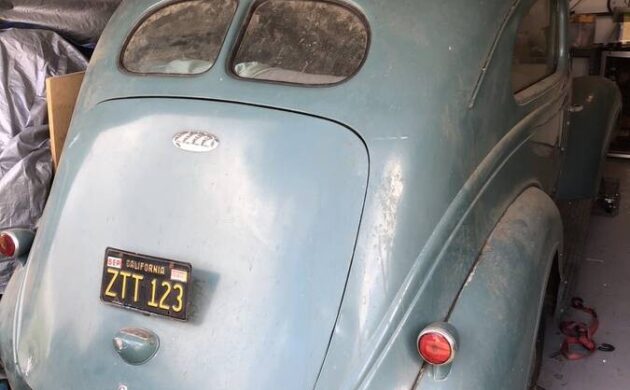
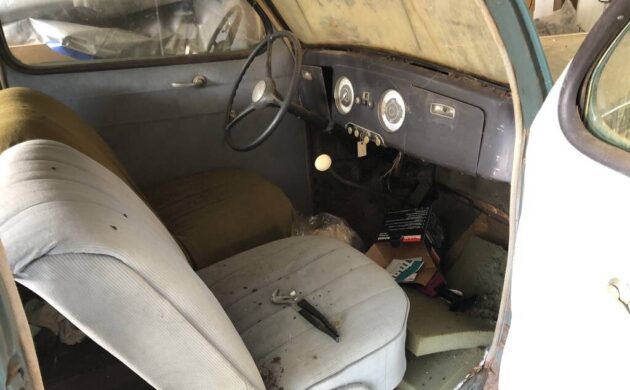
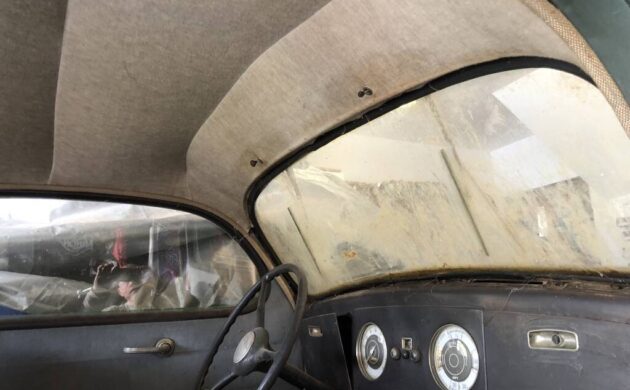
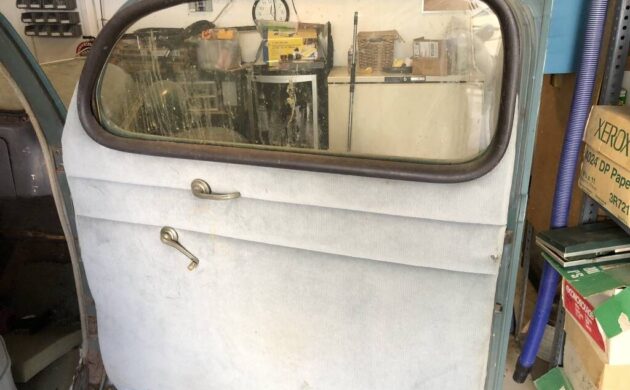
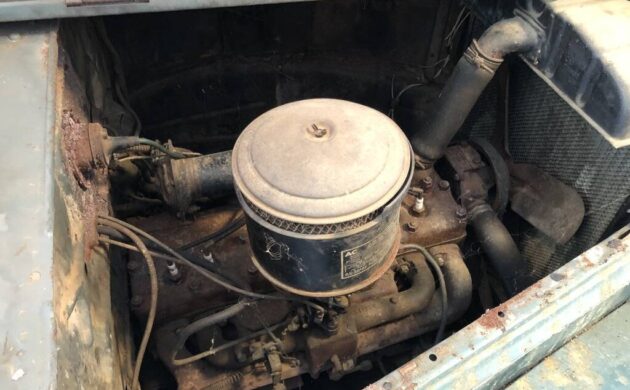

Comments
A title can be obtained in California, but you have to jump through hoops to get it such as hauling the car to a CHP office for VIN verification and dealing with the DMV, then pay whatever associated costs they deem necessary. For this price the seller, who is likely flipping the car, is asking should be the one doing the legwork.
Steve R
I don’t see a viable restoration here. You’ll be upside down fast. Hate to say it, but the best thing that could be done with this car is to hot rod it. I’d feel better with that situation out on the highway. Upgraded suspension, an small V8, with either an automatic of 4 speed, modern rear end and you’ll be able to keep up with traffic,and stop reasonably. It’ll be worth more that way than restored to stock.
That term “upside down” refers to potential resale value and is meaningless to hobbyists who buy, restore and keep cars because we actually LIKE them.
Bravo Jimmy Novak! My thoughts exactly. Here are some other related points. Whatever it costs, recreation always costs something. For me, the work is recreational. Replacing parts as you go is rather like car payments – the slower you work, the cheaper the hourly costs of the recreation. The beauty over car payments here though is that there is no interest being charged. Of course, I end up “upside-down”, but I’ve had years of fun building it and more years of fun driving it. Surely that’s worth something. By the time the car sells, I will have long forgotten how much I had in it; more likely, I’ll be dead by then. That sounds morbid but it simply means that at age 83 I have no plans to sell any of my hobby cars.
FWIW,
Allen
Exactly. I overpaid for my English 1959 Ford Zephyr 6 convertible and during the 9 year process of restoring the car everybody (my wife) thought I was spending too much money on it. I did as well but didn’t let the wife know my thoughts! Nineteen years later I sold it for a fortune as it was a very rare car and the buyer was one of those people that “just had to have it at any price”.
Voyager hood ornament is the best!
That’s the Mayflower.
Nice old Plymouth, well worth restoring. I see it has a radio, anybody care to take a guess at where the antenna is?
Possibly under the running board
Bingo, a long steel coil.
Maybe it’s the same as Chevrolet where the antenna is under the running board?
It’s either in the roof or under one the
running boards. My ’46 Special DeLuxe had one under the concealed
running board on the driver’s side.
Even if the original engine is toast,
virtually any engine from the ’30s to
1960 will bolt right in. I say this
because I read an article in the July
1970 issue of Rod & Custom about a
gentleman who did exactly that. He
swapped a ’53(?) engine into his ’35
Plymouth sedan with no trouble at all.
Mike Lamm must”ve liked it as he
wrote a glowing review of the gentleman’s car when he test drove it
in ’70. Think I’d put a double master
cylinder on it and seat belts in it before hitting the road. At least you’ll
pass the safety check.
Finally! A nice project car that hasn’t had half the parts pilfered off it. I can’t believe it still has the correct engine! I would love to make this my next project!
I would hope to see someone buy this for a more realistic price ($7,500?), spend a couple of thousand on brakes, tires, electrics, etc, – doing most of the work themselves – and have a wonderful around-town car, also fine for an occasional longer trip. These cars are bog-reliable (I drove a ’36 Plymouth for a few years as an every-day car), and were often chosen by salesmen for their robust and steady performance.
Coincidence…. I recently bought a 38 Plymouth in about the same condition. It had a great interior, all good glass, a good body, and nothing missing. And, I bought it in Placerville, probably no more than 80 miles from this one in Fairfield. It cost me $2200. I did the brakes and fuel system, and had a running, nice cruiser. My point is… this one is priced out of my ‘interest-range’. If it were priced right, I would be all over it. In my opinion, they are good cars.
I’ve got a pet peeve with just about all of these prewar mopar projects: the elegant original faux woodgrain on the dash and window frames has been painted over. I know – in many cases, it’s unsalvageable, but there used to be companies that restored these original patterns. My own first car, back in 1956, was a 1937 Plymouth. ‘ Lots of affection for these old cars.
The original engine engine and transmission would work fine on today’s highways. Chrysler did offer the Borg Warner overdrive as an option on their upscale offerings. My dad’s ’37 DeSoto had it. Beyond that, I might convert to disc brakes in front, and perhaps a higher ratio rear end. I would definitely stick with the flathead six, but maybe a ‘50s iteration. I’m not proposing a 75 mph car here, but 60 or 65 ought to get on the interstates. At least you don’t have to worry about your following distance!
FWIW,
Allen
In my opinion NEVER try to run these poor cars on interstates (that’s where most of the crazy, dangerous driver’s are) Enjoy the experience & go the U.S hwys or county roads….in a hurry? Drive your modern car or fly.
full rest0. This is the “classic” era to me late 30’s – very early 50s (in merican anyway) the curves – almost feminine in style (see Brit – XK for european example, french – see Delahaye)
BobH – thank you for the price information for your car; I am clearly out of touch, an optimist, or just plain wrong. I think your $2,200 is a bargain, but my $7,500 is clearly not in the right ball-park, either.
Tom, Just found your note on May 12, 2023. I don’t know any way to contact you, so hoping you will find this note. If the car is still available, please try to contact me. Text or phone 702-324-2859 or email rubiconmom1@aol
I can come & see it, almost anytime. Thank you, Bob
In CA you can Register a car with no title, but you cannot Sell it. My winter project, among others, is to take my ’93 Allante down to the DMV, and do the work to get a title. I bought the car in NH and did not get a title, since NH did not routinely issue them if the car was pre-1995 when I bought it, and go through the paper work to get a title. I did get it registered, and drive it, legally.
Title woes.
I bought a 1957 corvette 30 years ago, no title, just a purchase receipt. The VIN plate on the door frame was missing. The car was last registered in Ohio and I was living in California. California DMV directed me to the closest inspection station, where I was met by two Officers dressed in some classy coveralls with matching ball caps. They put my car on a lift and spent 20 minutes with a lamp and mirror, finding the original VIN on the frame. They ran that number against their database, which checked out, free & clear, not stolen. Accordingly they assigned a California VIN plate, pop riveted it onto where the original uses to be. Needless to say it was a positive experience. By the way on my back home to Salinas I was stopped two separate times by California Highway Patrol (CHP). The purpose for the stop was they wanted to see my car and give it a good look over. It’s great to know there were a couple of “motor heads” in law enforcement.
The shape it’s in and being a California car, it’s a decent price, I think.
I have been inquiring for what seems forever for a 38 tudor! Hard to tell the motor size and if it was U.S. made or Canadian. Big differences due to the war and maufacturing of this specific cars year. A lot of shifting of motors, parts and the works! Currently restoring a Canadian made38P-6 coupe with truck engine Trust me when I say parts may be available but finding them is very difficult trail to follow. Interested! so whats my next step? Wanting to negotiate shipping into the price, does that sound feasable?
It will a chevy drivetrain in it next year.
What a pity.